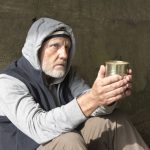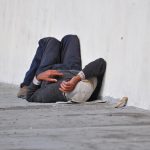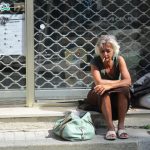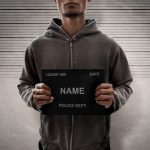Stop Criminalising Homelessness: An Interview with Homeless Persons Union’s Patrick “Spike” Chiappalone
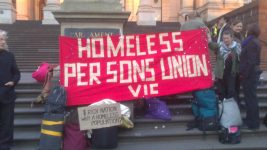
A crisis meeting was called at Melbourne Town Hall on Monday night to discuss the city’s homelessness situation, amid calls to create a new bylaw to ban sleeping rough on the city streets. Victoria police and the tabloid media have been pushing for the ban.
Melbourne lord mayor Robert Doyle announced last Thursday that he would be proposing outlawing sleeping on the streets, as contention has been growing over a number of homeless people sleeping at a camp at Flinders Street Station.
It was a surprising about face on the part of the lord mayor, who only the day before had criticised other cities around the world that simply “bundle homeless people up and ship them out.” He added that he’d “hate to think that we were ever that sort of city.”
The outcome of the crisis meeting
Monday’s meeting consisted of Mr Doyle, Victorian minister for housing Martin Foley, Victoria Police and several homelessness support agencies. And what transpired was that Doyle ended up asking for bylaws to be re-drafted to meet a request from police for further move-on powers.
However, which bylaws will be re-drafted has not been confirmed. It’s been reported the new move-on powers will apply to homeless people who refuse the help of support services. The decision on whether to pass the bylaws will be taken at the next City of Melbourne council meeting.
People living on the streets “pretending” to be homeless
The main proponent for the change to the bylaws is Victoria police chief commissioner Graham Ashton. Last week, he claimed that people sleeping rough in Melbourne’s CBD were pretending to be homeless so they could “shake down” tourists for money.
The top cop implied that the homeless people camped out the front Flinders Street Station were there to beg money from people visiting Melbourne for the Australian Open. He further described the camp as “disgusting” and a “very ugly sight.”
Hundreds with nowhere to go
A City of Melbourne survey found that last year there were 247 people sleeping rough around the city’s CBD, which is a 74 percent increase since 2014. Towards the end of last year, a group of homeless people were moved on from Hosier Lane, and police forcibly removed people from vacant government-owned houses in the city’s inner northern suburbs.
Victorian premier Daniel Andrews has claimed that the homeless people at Flinders Street have been offered accommodation. But many homeless people say that the crisis accommodation being offered is dangerous and temporary, and they’re safer sleeping in well-lit parts of the city.
The Homeless Persons Union Victoria is holding a Stop Criminalising Homelessness community speak out at Melbourne Town Hall this Saturday, to allow members of the public to have their say.
Sydney Criminal Lawyers® spoke with Patrick “Spike” Chiappalone a spokesperson for the Homeless Persons Union about the government’s inadequacy in dealing with Melbourne’s homelessness crisis.
Firstly, Spike what is the Homeless Persons Union Victoria?
The Homeless Persons Union came about as I had a long-term lived experience of homelessness and addiction.
And during my experience, I realised that there was no forum for people who’ve had that lived experience of homelessness and all that comes with that: the destruction of your social relationships, lack of social inclusion and your acceptance by the rest of the community as an equal.
For example, I was losing my teeth. I went to see a doctor. Because he knew I was homeless, rather than sending me to the dental hospital to get my teeth fixed, he just kept giving me antibiotics until they all fell out.
So there’s a prevailing view about who homeless people are. That they’re dysfunctional people. And so, I thought that it was important that there be some group. I mean we have bankers’ associations, transport users’ associations, different unions and organisations are formed for different groups.
Why not for people who are experiencing homelessness? Somewhere that they’re going to be respected, welcomed and can air their stories about what they experience on a daily basis. And where they can challenge some of the prevailing views.
What is the homelessness situation like in Victoria at the moment?
I find that, to be honest with you, a tricky question. Because the homeless situation has always been bad in Victoria.
At the last census, four years ago, it was 22,000. Now it’s probably about 25,000 homeless. And that’s not counting people in rooming houses, crisis accommodation and people sleeping in their cars.
What we’re seeing now is that people are not ashamed of being visible in their homelessness.
When we hear about the increase of housing prices and the increase in domestic violence within families, I find it difficult to believe why people can’t join the dots. Where are the children of these families that can’t afford housing or are experiencing domestic violence going to live?
These are the people on our streets. They have complex needs. They’ve been to hell and back – some of them are still in hell. The people that we’re seeing on our streets are the victims of the society that we’re living in.
On Monday there was a homelessness crisis meeting held at Melbourne Town Hall. The lord mayor Robert Doyle asked for bylaws to be redrafted to meet a request from police for further move-on powers. But there seems to be some contention about what is actually being called for.
In your understanding what’s going to happen?
The unfortunate aspect of this is that there’s a group of one elected official – who’s been elected in Melbourne, where retailers votes are counted twice – the police commissioner and a couple of CEOs – three of them from faith-based organisations, who pay no tax – who are invited to make decisions about the lives of people on the street.
And Doyle prevaricates depending on who his audience is. If he’s talking to a shock jock, he goes hard. If he’s talking to someone from the services, he understands that there’s underlining problems.
Personally, I believe he’s going to fall on the side of agreeing with his police minister that something has to be done. But the police are going to go in there with a service provider. And the last thing I heard is that if people refuse support from services, then they can be moved on.
It’s impossible to be a community worker holding a sanction of moving on or prison over someone’s head.
Last Thursday, Doyle said he was proposing to ban sleeping on the city streets, this was prior to saying that he did not approve of such measures. Police chief commissioner Graham Ashton was also calling tougher move-on laws. This was after Victoria police superintendent David Clayton had said move-on laws should not be used on homeless people.
Why are all these conflicting viewpoints being made at present?
That’s a really good question. And I think that reflects the complex nature of the issue that we’re facing. There’s not one solution. There needs to be a holistic solution that addresses the underlying problems.
These people did not just walk out of a home and decide to sleep on the streets, because it’s a good idea. They’re there because it’s well-lit and because they feel safe.
We have a problem in this state with access to public amenities. They’re there near the station because it’s close to toilets.
But because of the privatisation of public transport all public toilets are now closed at train stations. We have a lack of showers. We have a lack of access to kitchen facilities and laundry facilities. That’s another one of the problems that we’re facing.
On the one hand police want to move people on. And that’s such a Soviet response: if we make homelessness illegal, there’s no such thing as homelessness.
And on the other hand, you have people saying that’s not addressing the underlying issue. To address the underlying issue, we have to invest in long-term affordable public housing. And there seems to be no will to do that.
Ashton has also said that some of the people on the street are not actually homeless. He said they’re choosing to sleep there and they’re fake beggars who are trying to shake down visitors to the city for money.
What do you think about these claims?
Those claims are ridiculous. Ashton is not trained. He’s not an outreach worker. Has he gone there and spoken to any of those people? Does he understand some of the horrors that they’ve faced on a daily basis?
They may be self-medicating because they have to deal with issues that most people have not dreamed of experiencing. Just sleeping on Flinders Street on a daily basis would be nerve-racking if you weren’t self-medicating to some level.
For someone in his position to make generalisations about people whose experiences he knows nothing about that shouldn’t hold any water. And unfortunately, people don’t think about what he’s saying and who is saying it. That’s the scary thing.
We have a public who is prepared to give. And that’s the other part of the story. People are walking past and actually giving them stuff and offering and trying to support them. They’re trying to deny us our right to give and support our fellow community members. He’s telling us that’s wrong.
Last week, premier Daniel Andrews claimed his government had offered accommodation to everyone camped on Flinders Street.
What about that claim?
That’s probably occurred. But if you understand the nature of what those offers were, they would have been either crisis accommodation – where you are sharing facilities – some of it’s like minimum security detention. And these are run by faith-based organisations. You’re paying up to $230 a week. And Centrelink is $520 a fortnight, so people are paying their entire benefit to keep a roof over their head.
And some of these people are really young. They’re going to be preyed upon by more hardened people and that’s why they reject that offer.
So it’s either crisis accommodation or rooming houses, where you don’t know who you’re living with. And people are intimidated because they’re young. They want to be able to make a choice about who they’re living with. It’s quite a rational one.
I’ve lived in a rooming house for seven years. I wouldn’t wish it on my worst enemy. For seven years they pulled out two dead people a year.
People need to think about what these offers are. Unfortunately, the media doesn’t actually do its job and spell out what crisis accommodation is and what rooming houses are. They’re completely unregulated.
So you’re saying if these new bylaws come in that a young person is either facing a dangerous living situation, or they will be moved on by police.
If they move them on, where are they going to move them to? Where are they going to go? They’re going to be moved into the criminal justice system.
So someone who’s left their homes because they just can’t get along with their parents – maybe their parents drink, maybe they have mental health issues, maybe their parents are struggling because of the high cost of rent or with domestic violence. Their children leave their homes. They’re then living on the street with other children who have gone through a similar experience.
The police try and move them on. They refuse to move on. They’re then charged and pushed into the criminal justice system. They have this cycle of violence if that continues.
Begging is illegal in Victoria and a person can be imprisoned for up to 12 months for doing so. Victorian Greens MP Ellen Sandell has recently been calling for the decriminalisation of begging.
What sort of impact does this law have on Victoria’s homeless?
It’s demoralising. I don’t know if you’ve ever begged, or gone through town and seen people begging. I’ve had that experience. It’s quite humiliating. And when you think about what that principle is homeless people beg because they have no one else in their life that they can borrow money off.
People in the so-called normal economy, that have day-to-day jobs, are able to ask a mate to spot them $100 and they can get it, or they can go to a bank. Homeless people have to beg. It’s the same principle.
They’re asking someone for help. And because they have no one in their lives to give them that help, they’re asking the public. And the public gives that help.
Why should that be illegal? They’re pushing people into the criminal justice system.
And lastly, in your opinion what needs to happen to deal with the homelessness situation in Melbourne?
One example of what needs to happen, is when the Labor government took the opportunity to become very expedient and stop the East West Link.
They owned 303 properties that were bought with public money and were going to be demolished. They could have housed the 247 rough sleepers in Melbourne from the last street count, within six months. Instead they put publicly-owned properties on the private market.
There needs to be the political will to actually want to house these people in genuine long-term affordable housing and not in faith-based run crisis accommodation or unregulated rooming houses.
It’s just like we have universal healthcare and universal education. There needs to be an understanding that people need universal housing. And there isn’t the political will for that.
Spike thanks very much for speaking with us today. And I hope all goes well with the community speak out at Melbourne Town Hall this Saturday.
No worries. Thank you.


